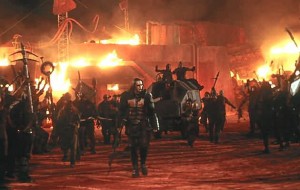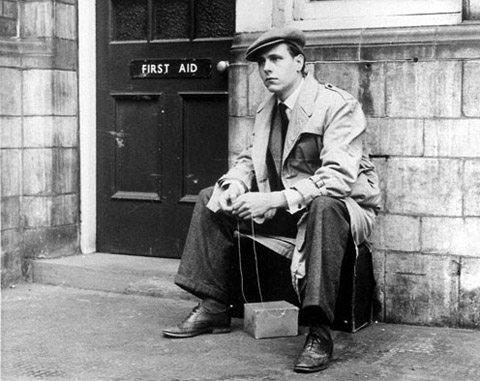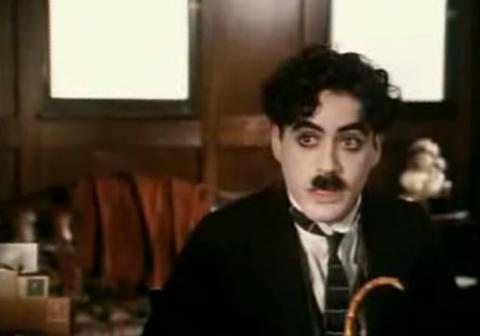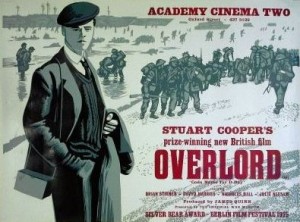From the Chicago Reader (August 20, 2001). — J.R.

John Carpenter at his most enjoyable generally means ‘Scope, working-class sass, kick-ass antiestablishment heroes, typecast villains who individually suggest quiet serial killers and collectively resemble hordes of whooping savages, a minimalist music score by Carpenter himself, and an overall affection for the way action movies looked and sounded 50 years ago. This movie — an action romp in which cops and prisoners go up against vengeful martian spirits on a colonized Mars in the year 2176 — adds a few more likable ingredients: a flashback structure with several overlapping points of view, great use of Ice Cube and Pam Grier, lap dissolves, and a notion of shifting alliances that keeps things hopping. (Natasha Henstridge as the head cop is pretty lively too.) As in many other Carpenter movies both good and bad, a lot of the cramped settings can be traced back to the original version of The Thing. With Jason Statham, Clea DuVall, and Joanna Cassidy; Larry Sulkis collaborated with Carpenter on the script. 98 min. (JR)
 Read more
Read more
Criterion has just released Overlord on Blue-Ray. Here are my two separate reviews of the film, written over three decades apart — for Monthly Film Bulletin, September 1975, Vol. 42, No. 500, and for the Chicago Reader, June 2, 2006. — J.R.
Overlord
Great Britain. 1975
Director: Stuart Cooper

Cert–A. dist-EMI. p.c–Joswend. p–James Quinn. p. manager—
Michael Guest. sc–Stuart Cooper, Christopher Hudson. ph–John
Alcott. optical effects–Vee Films. ed–Jonathan Gili. a.d–Michael
Moody, Barry Kitts. m–Partl Glass. songs–“The Lambeth Walk” by
Douglas Furber, Noel Gay; “We Don’t Know Where We’re Going” by
Ralph Butler, Noel Gay, sung by Nick Curtis. costume advice–Laurie
Milner. titles–Ann Hechle. sd. ed–Alan Be1l. sd. rec–Tony Jackson.
sd. re-rec–Gerry Humphries. l.p–Brian Stirner (Tom), Davyd Harries
(Jack), Nicholas Ball (Arthur), Julie Neesam (Girl), Sam Sewell (Trained
Soldier), John Franklyn-Robbins (Dad), Stella Tanner (Mum), Harry
Shacklock (Station-master), David Scheuer (Medical Officer), Ian Liston
(Barrack Guard), Lorna Lewis (Prostitute), Stephen Riddle (Dead German
Soldier), Jack Le White (Barman), Mark Penfold (Photographer), Micaela
Minelli (Little Girl), Elsa Minelli (Little Girl’s Mother). Read more
From the Chicago Reader (December 1, 1992), though this version of the capsule is corrected and slightly tweaked from the original. 2013 postscript: Last year, while preparing to teach a brief course about Chaplin in Brazil, I wound up reading the first good Chaplin biography I’ve encountered so far (as well as one of the shortest), published fairly recently — Stephen M. Weissman’s Chaplin: A Life (2008). Even though it’s written by a psychiatrist, which made me suspicious at first, Chaplin’s daughter Geraldine liked it enough to write an Introduction, and it’s easy to see why. I highly recommend it. — J.R.

Given the decision to cram as much as possible of Charlie Chaplin’s 88 years into one Richard Attenborough (Gandhi, Cry Freedom) blockbuster, it’s no surprise that this packaged tour through the great man’s career is unenlightening and obfuscating, despite an adept lead performance by Robert Downey Jr. Hard put to explain how the world’s most beloved individual could have been hounded out of this country and barred from re-entry, the movie can only invent a personal grudge on the part of J. Edgar Hoover (Kevin Dunn), letting everyone else off the hook; it also omits Monsieur Verdoux (perhaps Chaplin’s greatest achievement) entirely from its chronology. Read more





